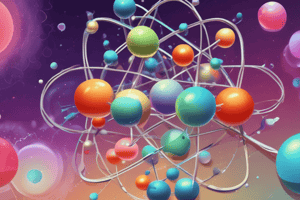Podcast
Questions and Answers
Which type of bonding is commonly found in inorganic materials like metals and non-metals?
Which type of bonding is commonly found in inorganic materials like metals and non-metals?
- Hydrogen bonds
- Ionic bonds
- Covalent bonds
- Metallic bonds (correct)
What property makes metals suitable for fabricating airplanes, cars, and electrical components?
What property makes metals suitable for fabricating airplanes, cars, and electrical components?
- Insulating
- Brittle
- Ductile (correct)
- Non-malleable
Which category of inorganic compounds includes examples like hydrochloric acid (HCl) and sulfuric acid (H2SO4)?
Which category of inorganic compounds includes examples like hydrochloric acid (HCl) and sulfuric acid (H2SO4)?
- Compounds of Oxygen
- Compounds of Halogens
- Compounds of Nitrogen
- Compounds of Hydrogen (correct)
What do halogens do to achieve a stable electron configuration when forming compounds?
What do halogens do to achieve a stable electron configuration when forming compounds?
Inorganic chemistry has significant applications in various fields. Which field specifically benefits from the use of inorganic compounds like fertilizers and pesticides?
Inorganic chemistry has significant applications in various fields. Which field specifically benefits from the use of inorganic compounds like fertilizers and pesticides?
What role do inorganic materials like semiconductors, ceramics, and metals play in the field of material science?
What role do inorganic materials like semiconductors, ceramics, and metals play in the field of material science?
What distinguishes ions from atoms?
What distinguishes ions from atoms?
Which type of bonding determines the properties and reactivity of inorganic molecules and materials?
Which type of bonding determines the properties and reactivity of inorganic molecules and materials?
What is the primary function of the periodic table in understanding inorganic chemistry?
What is the primary function of the periodic table in understanding inorganic chemistry?
Which of the following best describes the formation of compounds?
Which of the following best describes the formation of compounds?
In inorganic chemistry, what are the three primary types of reactions involved?
In inorganic chemistry, what are the three primary types of reactions involved?
What are the elements excluded from the realm of inorganic chemistry?
What are the elements excluded from the realm of inorganic chemistry?
Study Notes
Exploring Inorganic Chemistry
Inorganic chemistry, a branch of chemistry that deals with all elements except carbon, hydrogen, and the elements that primarily form covalent bonds with these two elements, encompasses a vast and diverse realm of molecules and materials. From the common table salt you sprinkle on your meals to the semiconductors in your smartphone, inorganic chemistry has a profound impact on our daily lives.
Atoms, Ions, and Compounds
Inorganic chemistry primarily revolves around atoms and their interactions to form ions and compounds. Ions are atoms that have a positive or negative charge due to gaining or losing electrons. Compounds, in contrast, are formed when atoms bond together to share electrons and achieve stable electron configurations.
Periodic Table and Trends
The periodic table, a tool that arranges the elements based on their atomic number, plays a vital role in understanding inorganic chemistry. Periodic trends, such as the variation in atomic size, ionization energy, reactivity, and electron configuration, allow chemists to anticipate chemical properties and behaviors without performing experiments.
Inorganic Reactions and Bonding
Inorganic chemistry involves numerous reactions, including synthesis, decomposition, and redox (oxidation-reduction) reactions. The type of bonding present in inorganic molecules and materials determines their properties and reactivity. Covalent bonds, ionic bonds, and metallic bonds are the most common types of inorganic bonding.
Inorganic Materials
Inorganic materials, such as metals, metalloids, and non-metals, possess unique properties that make them useful in various applications. For example, metals are ductile, malleable, and good conductors of electricity, making them suitable for fabricating airplanes, cars, and electrical components.
Inorganic Compounds
Inorganic compounds can be classified into several categories:
-
Compounds of Hydrogen: These include acids, acid anhydrides, salts, and metal hydrides. Examples include hydrochloric acid (HCl), sulfuric acid (H2SO4), sodium chloride (NaCl), and hydrogen gas (H2).
-
Compounds of Oxygen: These include oxides, peroxides, and hydroxides. Examples include water (H2O), hydrogen peroxide (H2O2), and sodium oxide (Na2O).
-
Compounds of Halogens: Halogens form compounds with other elements by gaining one electron to achieve a stable electron configuration. Examples include chlorine gas (Cl2), hydrogen chloride (HCl), and potassium fluoride (KF).
-
Compounds of Nitrogen: Nitrogen forms compounds by losing three electrons to achieve a stable electron configuration. Examples include ammonia (NH3), nitrogen gas (N2), and nitric acid (HNO3).
Importance of Inorganic Chemistry
Inorganic chemistry has many applications in various fields, including:
- Material science: Inorganic materials, such as semiconductors, ceramics, and metals, are vital for developing advanced technologies.
- Energy: Inorganic compounds are used in batteries, fuel cells, and solar cells.
- Environmental science: Inorganic chemistry helps us understand and address issues such as air and water pollution and waste management.
- Agriculture: Inorganic compounds, such as fertilizers, insecticides, and pesticides, are essential for crop production and food security.
Inorganic chemistry is a dynamic field that continues to evolve, contributing to our understanding of the world around us and enabling new technological advancements. Whether it's the development of new materials, the discovery of novel compounds, or the optimization of existing processes, inorganic chemistry remains a critical component of modern science and industry.
Studying That Suits You
Use AI to generate personalized quizzes and flashcards to suit your learning preferences.
Description
Test your knowledge of inorganic chemistry, including atoms, ions, compounds, periodic table trends, reactions, bonding, materials, and various inorganic compounds. Explore the applications of inorganic chemistry in material science, energy, environmental science, and agriculture.




